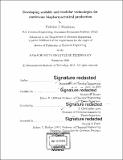Developing scalable and modular technologies for continuous biopharmaceutical production
Author(s)
Mozdzierz, Nicholas J.(Nicholas Joseph)
Download1103713261-MIT.pdf (39.78Mb)
Other Contributors
Massachusetts Institute of Technology. Department of Chemical Engineering.
Advisor
Richard D. Braatz and J. Christopher Love.
Terms of use
Metadata
Show full item recordAbstract
The existing biopharmaceutical manufacturing paradigm is poorly suited to produce biologic drugs on demand at a point-of-care. Generally, commercial-scale manufacturing using fed-batch cultivation and fixed infrastructure is concentrated in developed nations and results in process cycle times of weeks or months. Coupled with the complex logistical challenges associated with continuous 'plant-to-patient' cold-chains, the geographically biased nature of therapeutic protein production today can limit access to biologic drugs in developing areas of the world. These same logistical hurdles can also hamper the efficient distribution of life-saving protein therapeutics following crises in developed nations. Compounding these issues is the fact that lead times between bioreactor inoculation and patient dosing typically range from 6 to 12 months due to processing and regulatory constraints. As such, there is an opportunity to create technologies capable of rapidly generating biopharmaceuticals in emergency situations and remote healthcare settings. A platform that couples modular flow-through bioreactors and purification systems with real-time feedback control has the potential to bridge this gap if developed in parallel with appropriate expression hosts. To this end, we first developed a state-of-the-art microfluidic perfusion process that supported sustained secretion of heterologous proteins from the yeast Komagataella phaffi. Using palm-sized bioreactors with a 1 mL cultivation volume, we showed that 1 - 10 adult doses worth of hGH or IFN[alpha]-2b could be manufactured in under 24 hours. Next, we reengineered an array of 1 L-scale stirred-tank bioreactors to operate under continuous perfusion conditions and integrate with custom-built reconfigurable chromatography systems. Leveraging controllers designed in-house, we demonstrated that this system was capable of meeting the metabolic demands of high-density cultures of K. phaffi and preventing perfusion filter fouling. We further showed the production of high-quality hGH and IFN[alpha]-2b via the direct transfer of cell-free perfused supernatant onto a chromatography system, and extended these results to the automated expression and purification of over 400 adult doses of hGH in under one week. Finally, we designed and built a scalable, tubular crystallizer that leverages continuous slug-flow, directed ultrasonic irradiation, modular counter-current heat exchangers, and model-predictive control to tune the crystal size distributions of small-molecules and proteins alike.
Description
Thesis: Ph. D., Massachusetts Institute of Technology, Department of Chemical Engineering, 2018 Cataloged from PDF version of thesis. Includes bibliographical references (pages 327-353).
Date issued
2018Department
Massachusetts Institute of Technology. Department of Chemical EngineeringPublisher
Massachusetts Institute of Technology
Keywords
Chemical Engineering.